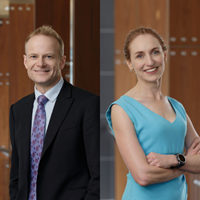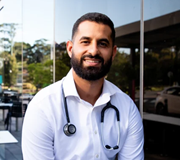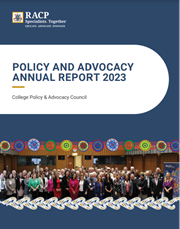The President's Message – 16 November
Hello and Kia ora everyone. I’m Dr Jacqueline Small, President of the Royal Australasian College of Physicians. I would like to acknowledge the Gadigal people of the Eora Nation as the traditional owners and custodians of the lands I’m joining you from. I extend my respect to all Aboriginal, Torres Strait Islander, and Māori people. Together we restate our shared commitment to advancing Aboriginal, Torres Strait Islander and Māori health and education as core business of the RACP.
One of the College’s most joyful and exciting events is Convocation in which we celebrate and welcome new Fellows to our College. Professor Geoff McColl, Rheumatologist, President of the Australian Medical Council and Executive Dean of the Faculty of Medicine at the University of Queensland was the keynote speaker. I want to share some of his message with you.
Geoff spoke of the critical role that we as Fellows have; that of health system steward. This might be reasonably defined as the careful and responsible management of the health system by health professionals. Geoff encouraged our new Fellows to reflect at this point of transition on three areas of stewardship. One – patient centred care; two – value-based care; and three – health system culture.
Our healthcare systems costs are growing at a rate greater than inflation. Estimates of no-value or low-value care are plausibly 20 to 30 per cent of our care. Geoff encouraged us to be cognisant of implementing the highest value care in all we do. He also spoke of being a custodian of culture. The last decade has presented many egregious examples of poor culture in the health system – not exclusively enacted by doctors, but often by doctors – bullying, sexual harassment, racism and other poor behaviour.
The RACP is continuing to deliver value to you, our members, through key activities such as RACP MyCPD that is staying abreast of the latest changes to make it easier for you. While CPD Homes is being driven by the Medical Board of Australia. Our College is actively transitioning to support you in your CPD
If you’re a Fellow, your Fellowship means you belong to the RACP MyCPD Home. We’ve made carefully considered changes and provided more resources to better support you and your CPD needs across the three categories. Notably, we've launched the Supporting Professionalism in Practice – The Framework in Action guide, showcasing expected attributes across the ten domains of professional practice. This guide is a tool for self-reflection, peer review, and development.
Non-members can access our CPD program, via the CPD user registration form found on our website. We’ve also made key improvements to simplify CPD recording such as automated CPD recording for those of you who generously contribute to College activities and QR codes to record activities in real time. The RACP is uniquely placed to work with your specialty society to support you in your CPD.
In making the decision to raise fees for 2024 the Board carefully reviewed necessary expenditure and rising operating costs. As you know – the Board decided to increase fees by six per cent for both trainees and Fellows for the 2024 year – in line with CPI. In recent years, we have worked to contain increases in fees. Last year when other Colleges increased their fees on average by five per cent, we did not increase fees, and over the last decade we have consistently held fee increases below CPI.
In addition to rising costs, we are commencing significant transformation projects to improve training and member experiences. These include IT platforms to support our Training Management Program, linked to our Australian Medical Council accreditation.
We are actively reviewing expenditure of the College specifically in areas such as travel and other operational costs. But our investment needs are greater than what operational efficiencies alone can deliver. We are very aware that you would like more details on how your fees are spent and are actively working to provide that detail.
Physician training is an extraordinary journey of learning and is extremely challenging. The Board and I are very aware that some College processes can delay your progression through training, and we’re committed to changing that to support you. This year, we’ve begun an education governance review. We are going to improve decision and response timeframes, as well as reporting and escalation pathways, which will speed up those critical processes.
For Advanced Trainees we are working on the redesign of our Advanced Training curriculum in 38 key specialties. Invitations to participate in the consultative feedback process will be emailed shortly, and you have until the first week of January 2024 to have your say.
With your help, we aim to develop modern curricula which are relevant and relatable, while remaining agile enough to embrace future innovations. New technologies, such as AI, are progressing at great speed and undoubtably will have a dramatic impact for medicine and our profession.
Collegiate institutions like the RACP play a very important role in these rapidly changing times. As a learned group of highly trained medical scientists, we possess enormous collective expertise and capability. We can help ensure these remarkable technologies are used to enhance our roles as physicians, and collectively improve the health of our communities.
My final comment is to congratulate one or our trainees, Dr Daniel Nour, Advanced Trainee in cardiology for his incredible achievements. Daniel established Street Side Medics to take healthcare to the homeless after becoming aware of their barriers to accessing healthcare. Daniel was Young Australian of the Year in 2022 and has been nominated for a Human Rights Award in Australia this year. He recently became the first Australian to receive the Spirituality Award at the Muhammed Ali Humanitarian Awards for his work.
Thank you for watching.
Dr Jacqueline Small
RACP President
To contact Jacqueline, please email president@racp.edu.au
We welcome Mr Lee Whitney as the new Chief Executive Officer of the College. Lee's strong background in strategy, membership organisations, technology and financial management sets the College up for a great future. Please watch this video of Lee and RACP President, Dr Jacqueline Small.

Congratulations to melanoma treatment pioneers Professor Georgina Long AO FRACP, and Professor Richard Scolyer for being the recipients of the NSW 2024 Australian of the Year Award. Their achievements are inspirational and are a testament to the incredible work RACP members do.
After Richard was diagnosed with incurable brain cancer, the pair set about to use their expertise to save Richard's life and the results have been astounding.
Professor Georgina Long AO received the 2013 Sir Roy MaCaughey Fellowship from RACP Foundation worth $75,000 for her project, Enhancing response to MAP kinase inhibition in melanoma. We are incredibly proud to see the incredible work she's done since receiving this Fellowship.
 Congratulations to former Young Australian of the Year, Dr Daniel Nour. He's been selected for one of Muhammad Ali Centre’s annual humanitarian awards, from his family. Dr Nour is the first Australian to be recognised since the awards began in 2013. He will fly to Louisville, Kentucky to receive this prestigious award. Read more in The Sydney Morning Herald's article. Dr Nour is also a finalist for the 2023 Human Rights Awards, another incredible achievement.
Congratulations to former Young Australian of the Year, Dr Daniel Nour. He's been selected for one of Muhammad Ali Centre’s annual humanitarian awards, from his family. Dr Nour is the first Australian to be recognised since the awards began in 2013. He will fly to Louisville, Kentucky to receive this prestigious award. Read more in The Sydney Morning Herald's article. Dr Nour is also a finalist for the 2023 Human Rights Awards, another incredible achievement.
In 2020, Dr Nour founded Street Side Medics, a mobile health service for people experiencing homelessness in several locations across NSW. Street Side’s volunteers include GPs, physiotherapists and nurses.
 The Policy & Advocacy Annual Report 2023 (Oct 2022-Oct 2023) highlights a wide range of activities from the College Policy and Advocacy Council (CPAC), the College’s member groups and the Policy & Advocacy team.
The Policy & Advocacy Annual Report 2023 (Oct 2022-Oct 2023) highlights a wide range of activities from the College Policy and Advocacy Council (CPAC), the College’s member groups and the Policy & Advocacy team.
At the beginning of the report, a selection of member representation and advocacy outcomes are highlighted in light of the recent work on the Member Value Proposition.
The CPAC and its representatives connect across the College, engaging with and supporting specialty and state and territory led policy and advocacy activities. Member engagement is critical to being able to build on the College’s policy and advocacy achievements and therefore, we would be most grateful if you could share this report within your member networks.
Together, we continue strengthening the College’s reputation as one of the leaders for health policy advice to Government and other health stakeholders.
Read now
The RACP 2023 Member Statistics and Insights Report has just been released. This report provides an aggregated snapshot of College membership as at 30 June 2023 using member data from the College’s customer relationship management (CRM) system.
The report displays a range of characteristics of the membership including demographic measures such as age, gender and location, as well as other characteristics such as largest training sites, specialty and more. Additional analysis has also enabled the report to include trend information about various characteristics of the membership over a number of years.
Prioritising equity and access
Between March and July 2022 alone, around 118 million telehealth services were delivered to 18 million patients across Australia and more than 95,000 medical practitioners have engaged in telehealth services. The broadening use of telehealth in Australia presents a unique opportunity to transform our healthcare system, address unmet needs, and reduce health inequities. The development of ongoing MBS telehealth arrangements is critical for Australia to capitalise on this opportunity and edge toward these goals.
The RACP has provided a submission to the MBS Review Advisory Committee’s (MRAC) second stage of post implementation review of MBS Telehealth items. Our submission stresses the need for flexibility and patient-physician choice in addressing access and equity issues that affect many Australians.
Read the submission
Earlier this year, Associate Professor Anne Powell FRACP, Program Director of Physician Education, Alfred Health in Melbourne; Monash University contributed to a Pomegranate podcast on “Setting the standard for workforce wellbeing.”
Associate Professor Powell is now undertaking a specific wellbeing study, sponsored by Monash University, to better understand the range of stressors and protective professional factors during the final year of basic training.
Basic Trainees (BTs), and those Directors of Physician Education (DPEs) in Australia and New Zealand of BTs, who completed the RACP written and/or clinical examinations in 2023 are welcome to participate in the study.
For more details, to access the survey, and/or register to participate in a focus group, please visit:
BT Qualtrics webpage | DPE Qualtrics webpage
The College was invited to the National Resilience Taskforce health sector roundtable that was held in September and run by the Department of Home Affairs. The Taskforce was set up by the Australian Government to explore how it can enhance crisis response and recovery during times of national crises and disasters. The Government also released the Alternative Commonwealth Capabilities for Crises Response Discussion Paper for public consultation.
Our submission to the Taskforce advocates for a proactive crisis response approach, emphasising prevention, preparedness, and resilience by strengthening healthcare systems and building resilient communities. The submission also highlights the crucial role of health services in crisis readiness, alongside First Nations sovereignty and Aboriginal Community Controlled Health Services. It also stresses the importance of national coordination for climate resilience, tailored crisis responses, healthcare practitioners' expertise, a well-equipped healthcare sector, a coordinated medical workforce, and funding for the Australian Centre for Disease Control.
Read the submission
The Adult Medicine Leadership and Management Workshop will be held at the RACP Melbourne office on Saturday, 25 November. With a focus on the acquisition of valuable leadership skills and how to use these skills in a clinical setting, interest in this workshop has been overwhelming. Though registrations have now closed, those who are interested in participating can be added to the workshop waitlist on the registration page.
Partial scholarships are available now for women in healthcare ranging from $1,000 to $5,000 per person, for one of four leadership and workplace skill development programs. These scholarships are aimed at encouraging more women to increase their impact at work, progress their career, and step into leadership roles. Expressions of interest close on Friday, 24 November 2023.
Find out more
Twelve months ago, in response to the evolving regulatory landscape shaped by the Medical Board of Australia and the Medical Council of New Zealand, the 2023 MyCPD Framework was introduced. The Framework has enhanced the way we approach our CPD activities. The 2024 Framework changes are centred around three key areas – supervisor activities, research activities, and cultural safety and health equity.
Over the course of these 12 months, the CPD Committee and the College staff have worked with us, as we have adapted to this new CPD landscape. Now, as we approach 2024, the MyCPD Framework will undergo a few strategic modifications. These adjustments are not only informed by feedback from Fellows, but also by insights from the regulatory bodies.
To provide you with an understanding of these modifications, the chairman and members of the CPD Committee Professor Martin Veysey, Dr Owen Sinclair, and Dr Catherine D’Souza, explain the changes to the 2024 MyCPD Framework.
Find out more
Your Fellowship means you belong to the RACP MyCPD Home. Your College is dedicated to enhancing your CPD experience. So far this year, we’ve made key improvements to simplify CPD recording to allow you to focus on meaningful professional development activities.
We've introduced automated CPD activity recording for those of you who generously contribute to College activities. This means you don’t have to record College CPD activities retrospectively. We have also partnered with five specialty societies, Hunter New England Health, The Water Well Project and AIDA to pilot a streamlined approach to CPD recording, which will shape the future extension of this initiative to further automate CPD activity recording. It includes the trial of QR codes to record activities in real-time which many of you have suggested.
We've also launched the new MyCPD Framework to enable you to meet your regulatory requirements into the future. Our educational resources have been improved to better support your CPD needs across the three categories. Notably, we've launched the "Supporting Professionalism in Practice – The Framework in Action" guide, showcasing expected attributes across the ten domains of professional practice. This guide is a tool for self-reflection, peer review, and development.
In August, we held a CPD webinar for those of you in private practice, which was well received and concluded with a very engaged Q&A session. We plan to hold more of these webinars to support you with your CPD obligations. We're also committed to improving resources and support for embedding cultural safety within CPD, and have provided information, support, and resources to support Fellows in doing so.
Some of you have been asking how colleagues can access our CPD program now that the MBA require all registered practitioners to select a CPD home. Non-members can access our CPD Program, via the CPD user registration form found on our website.
Earlier this year, the Australian Government introduced MyMedicare – a voluntary new patient registration system that aims to formalise the relationship between patients, their general practice, general practitioner and primary care teams.
For more information on registering your practice, visit the Services Australia Health Professional Education website. A communication kit has been developed with a range of resources to support health professionals in having conversations with patients, including FAQs, factsheets, a brochure and posters. Subscribe for more updates on MyMedicare.
It is estimated that 30 per cent of our healthcare systems in Australia and Aotearoa New Zealand are ‘low value’, with 10 per cent being harmful to the patient. Between 10 and 60 per cent of tests and treatments are also inappropriate. The Evolve initiative aims to reduce low value care by supporting physicians to be leaders in changing clinical behaviour.
Watch these animations to find out more about how you can join the Evolve movement and find out more about the Evolve and Australasian Chapter of Addiction Medicine's top-5 recommendations of low-value practices within addiction medicine.
Find out more about Evolve
RACP Online Learning offers a wide array of dynamic online resources to support you in meeting your CPD requirements. Access resources by CPD Framework Category, search for a particular topic within each category, or simply browse the full collection of engaging online courses, podcasts and lectures designed to enhance your learning across all of the professional practice domains.
As healthcare workers who dedicate our lives to helping others, it’s important to take the time to care for ourselves. We would like to remind everyone that it's okay to not be ok. If you need someone to talk to, you can reach out to the RACP Support Program. It's a free, 24/7 and completely confidential support service that is delivered externally through Converge International.
Whether you have something worrying on your mind, are finding getting out of bed to be a struggle, or just feel like talking to someone for helpful, judgement-free advice, this free support service may be just what you need.
Find out more
 Whether you are a New Fellow, established within your career, or beginning to wind down for retirement, the RACP CPD Home can support you to meet your specialist regulatory requirements.
Whether you are a New Fellow, established within your career, or beginning to wind down for retirement, the RACP CPD Home can support you to meet your specialist regulatory requirements.
We have a long history as an accredited CPD provider within Australia and Aotearoa New Zealand, and our MyCPD team are at hand to provide you with tailored guidance throughout the annual CPD cycle. Plus, your RACP membership means you can access the RACP Online Learning platform for a selection of tools and resources relevant to you throughout your career.
You have never stopped learning, we’re here to make sure that continues. My RACP. MyCPD Home.
Find out more
Stay informed
Read other RACP eBulletins and access current news on the RACP Online Community (the ROC):
Join the conversation in the ROC